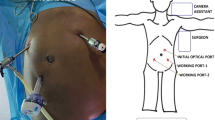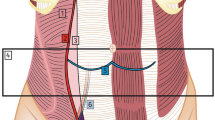Abstract
Background
Primary and incisional hernia can be repaired by multitrocar laparoscopy. Single-access laparoscopy (SAL) recently gained interest to decrease the invasiveness and to reduce the abdominal trauma, besides improved cosmetic results. The authors report first 50 patients who consulted for primary and incisional hernia and treated by SAL prosthetic repair.
Patients and methods
Between December 2009 and March 2012, 50 patients (24 females, 26 males) were submitted to SAL for primary (23) and incisional hernia (27). Mean age was 49.1 ± 15.1 years (17–75), and mean body mass index 29.7 ± 5.7 kg/m2 (19–44.1). A total of 26 primary and 30 incisional hernias were treated. The technique consisted in implied the use of an 11-mm trocar for 10-mm scope, curved reusable instruments without trocars, and dualface prosthesis fixed by tacks without transfascial closures.
Results
No conversion to open surgery nor addition of one or more trocars was necessary. Mean perioperative hernia sizes were 7.0 ± 5.0 cm (2–24) in length and 6.0 ± 3.4 cm (1–16) in width, for a surface of 55.0 ± 64.6 cm2 (2.8–268.2). Mean prosthesis size used was 188.1 ± 113.4 cm2 (56.2–505.6). Mean laparoscopic time was 60.2 ± 32.8 min (26–153), and mean final scar length was 21.2 ± 4.5 mm (13–35). Mean hospital stay was 2.2 ± 1.2 days (1–8). Perioperative complications were registered in 4 patients and minor early complications in 13 patients of each group. After a mean follow-up of 16.1 ± 8.8 months (4–34), 2 late complications were observed in one patient of each group.
Conclusion
Primary and incisional hernia can safely be treated by SAL prosthetic repair, but a learning curve is unavoidable. Thanks to this approach, in patients with primary hernia, only a small scar is finally visible, and in patients who proved to be prone to develop incisional hernia, the number of fascial incisions can be reduced.





Similar content being viewed by others
References
Conze J, Prescher A, Schlachter M, Schumacher O (2007) The umbilical hernia. In: Fitzgibbons RJ, Schumpelick V (eds) Recurrent hernia prevention and treatment. Springer, Berlin, pp 359–364
Mudge M, Hughes LE (1985) Incisional hernia: a 10 year prospective study of incidence and attitudes. Br J Surg 72(1):70–71
Luijendijk RW, Hop WC, van den Tol MP, de Lange DC, Braaksma MM, IJzermans JN, Boelhouwer RU, de Vries BC, Salu MK, Wereldsma JC, Bruijninckx CM, Jeekel J (2000) A comparison of suture repair with mesh repair for incisional hernia. N Engl J Med 343(6):392–398
Akman PC (1962) A study of five hundred incisional hernias. J Int Coll Surg 37:125–142
Read RC, Yoder G (1989) Recent trends in the management of incisional herniation. Arch Surg 124(4):485–488
Sauerland S, Walgenbach M, Habermalz B, Seiler CM, Miserez M (2011) Laparoscopic versus open surgical techniques for ventral or incisional hernia repair. Cochrane Database Syst Rev Mar 16(3):CD007781
Forbes SS, Eskicioglu C, McLeod RS, Okrainec A (2009) Meta-analysis of randomized controlled trials comparing open and laparoscopic ventral and incisional hernia repair with mesh. Br J Surg 96(8):851–858
Bingener J, Buck L, Richards M, Michalek J, Schwesinger W, Sirinek K (2007) Long-term outcomes in laparoscopic vs open ventral hernia repair. Arch Surg 142(6):562–567
Lomanto D, Iyer SG, Shabbir A, Cheah WK (2006) Laparoscopic versus open ventral hernia mesh repair: a prospective study. Surg Endosc 20(7):1030–1035
Lau H, Patil NG (2003) Umbilical hernia in adults. Surg Endosc 17(12):2016–2020
Gonzales R, Mason E, Duncan T, Wilson R, Ramshaw BJ (2003) Laparoscopic verus open umbilical hernia repair. JSLS 7(4):323–328
Wright BE, Beckerman J, Cohen M, Cumming JK, Rodriguez JL (2002) Is laparoscopic umbilical hernia repair with mesh a reasonable alternative to conventional repair? Am J Surg 184(6):505–508
DeMaria EJ, Moss JM, Sugerman HJ (2000) Laparoscopic intraperitoneal polytetrafluoroethylene (PTFE) prosthetic patch repair of ventral hernia. Prospective comparison to open prefascial polypropylene mesh repair. Surg Endosc 14(4):326–329
Carbajo MA, Martin del Olmo JC, Blanco JI, de la Cuesta C, Toledano M, Martin F, Vaquero C, Inglada L (1999) Laparoscopic treatment vs open surgery in the solution of major incisional and abdominal wall hernias with mesh. Surg Endosc 13(3):250–252
LeBlanc KA, Booth WV (1993) Laparoscopic repair of incisional abdominal hernias using expanded polytetrafluoroethylene: preliminary findings. Surg Laparosc Endosc 3(1):39–41
Chelala E, Gaede F, Douillez V, Dessily M, Alle JL (2003) The suturing concept for laparoscopic mesh fixation in ventral and incisional hernias: preliminary results. Hernia 7(4):191–196
Wassenaar E, Schoenmaeckers E, Raymakers J, van der Palen J, Rakic S (2010) Mesh-fixation method and pain and quality of life after laparoscopic ventral or incisional hernia repair: a randomized trial of three fixation techniques. Surg Endosc 24(6):1296–1302
Eriksen JR, Bisgaard T, Assaadzadeh S, Jorgensen LN, Rosenberg J (2011) Randomized clinical trial of fibrin sealant versus titanium tacks for mesh fixation in laparoscopic umbilical hernia repair. Br J Surg 98(11):1537–1545
Pierce RA, Spitler JA, Frisella MM, Matthews BD, Brunt LM (2007) Pooled data analysis of laparoscopic vs open ventral hernia repair: 14 years of patient data accrual. Surg Endosc 21(3):378–386
Heniford BT, Park A, Ramshaw BJ, Voeller G (2003) Laparoscopic repair of ventral hernias: 9 years’ experience with 850 consecutive hernias. Ann Surg 238(3):391–399
Helgstrand F, Rosenberg J, Bisgaard T (2011) Trocar site hernia after laparoscopic surgery: a qualitative systematic review. Hernia 15(2):113–121
Bucher P, Pugin F, Morel P (2011) Single-port access prosthetic repair for primary and incisional ventral hernia: toward less parietal trauma. Surg Endosc 25(6):1921–1925
Noel JK, Fahrbach K, Estok R, Cella C, Frame D, Linz H, Cima RR, Dozois EJ, Senagore AJ (2007) Minimally invasive colorectal resection outcomes: short-term comparison with open procedures. J Am Coll Surg 204(2):291–307
Laurent C, Leblanc F, Bretagnol F, Capdepont M, Rullier E (2008) Long-term wound advantages of the laparoscopic approach in rectal cancer. Br J Surg 95(7):903–908
Roberts KE, Panait L, Duffy AJ, Bell RL (2010) Single-port laparoscopic umbilical hernia repair. Surg Innov 17(3):256–260
MacDonald E, Pringle K, Ahmed I (2009) Single port laparoscopic repair of incarcerated ventral hernia. Re: laparoscopic repair of incarcerated ventral abdominal wall hernias, Shah RH et al. (2008). Hernia 13(3):339
Podolsky ER, Mouhlas A, Wu AS, Poor AE, Curcillo PG 2nd (2010) Single port access (SPA) laparoscopic ventral hernia repair: initial report of 30 cases. Surg Endosc 24(7):1557–1561
Bower CE, Love KM (2011) Single incision laparoscopic ventral hernia repair. JSLS 15(2):165–168
Tsivian A, Tsivian M, Sidi AA (2011) Laparoendoscopic single-site repair of incisional hernias after urological surgery. Urology 78(3):715–718
Barbaros U, Demirel T, Sumer A, Deveci U, Tukenmez M, Cansumar MI, Kalayci M, Dinccag A, Seven R, Mercan S (2011) SILS Incisional hernia repair: is it feasible in giant hernias? A report of three cases. Diagn Ther Endosc 2011:387040
Muysoms FE, Miserez M, Berrevoet F, Campanelli G, Champault GG, Chelala E, Dietz UA, Eker HH, El Nakadi I, Hauters P, Hidalgo Pascual M, Hoeferlin A, Klinge U, Montgomery A, Simmermacher RK, Simons MP, Smietański M, Sommeling C, Tollens T, Vierendeels T, Kingsnorth A (2009) Classification of primary and incisional abdominal wall hernias. Hernia 13(4):407–414
Hanna GB, Shimi SM, Cuschieri A (1998) Task performance in endoscopic surgery is influenced by location of the image display. Ann Surg 227(4):481–484
Romanelli JR, Earle DB (2009) Single-port laparoscopic surgery: an overview. Surg Endosc 23(7):1419–1427
Hanna GB, Drew T, Clinch P, Hunter B, Cuschieri A (1998) Computer-controlled endoscopic performance assessment system. Surg Endosc 12(7):997–1000
Ahmed I, Paraskeva P (2011) A clinical review of single-incision laparoscopic surgery. Surgeon 9(6):341–351
Berger D, Muller A, Bientzle M (2003) Laparoscopic repair of ventral hernia. Eur Surg 35:25–27
Hesselink VJ, Lujendijk RW, de Wilt JH, Heide R, Jeekel J (1993) An evaluation of risk factors in incisional hernia recurrence. Surg Gynecol Obstet 176(3):228–234
Eryilmaz R, Sahin M, Tekelioglu MH (2006) Which repair in umbilical hernia of adults: primary or mesh? Int Surg 91(5):258–261
Theodoropoulou K, Lethaby D, Hill J, Gupta S, Bradpiece H (2010) Laparoscopic hernia repair: a two port technique. JSLS 14(1):103–105
Berger D, Bientzle M, Muller A (2002) Postoperative complications after laparoscopic incisional hernia repair. Incidence and treatment. Surg Endosc 16(12):1720–1723
Gurusamy KS, Allen VB, Samraj K (2012) Wound drains after incisional hernia repair. Cochrane Database Syst Rev Feb 15(2):CD005570
Conflict of interest
The first author is consultant for Karl Storz-Endoskope, Tuttlingen, Germany. The other authors have no commercial associations that might be a conflict of interest in relation to this article.
Author information
Authors and Affiliations
Corresponding author
Rights and permissions
About this article
Cite this article
Dapri, G., Bruyns, J., Paesmans, M. et al. Single-access laparoscopic primary and incisional prosthetic hernia repair: first 50 patients. Hernia 17, 619–626 (2013). https://doi.org/10.1007/s10029-012-1025-z
Received:
Accepted:
Published:
Issue Date:
DOI: https://doi.org/10.1007/s10029-012-1025-z




